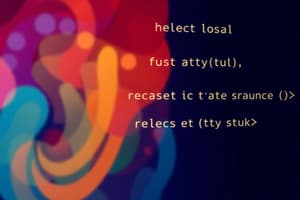Podcast
Questions and Answers
What value will be logged after executing myFunction()? Assume let a; let b; are appropriately declared.
What value will be logged after executing myFunction()? Assume let a; let b; are appropriately declared.
- undefined
- -100 (correct)
- 0
- true
What will be logged when console.log(b); is executed after calling myFunction() that assigns b = true;?
What will be logged when console.log(b); is executed after calling myFunction() that assigns b = true;?
- null
- reference error
- undefined
- true (correct)
What does myFunction(5, 10); log to the console?
What does myFunction(5, 10); log to the console?
- 5
- 5 and 10 (correct)
- 10
- 15
What would be the output of console.log(myFunction(5, 10));?
What would be the output of console.log(myFunction(5, 10));?
What naming convention is recommended for functions that create something?
What naming convention is recommended for functions that create something?
What components are essential in a function declaration?
What components are essential in a function declaration?
What will the following code return: function square(number) { return number * number; } when called with square(4)?
What will the following code return: function square(number) { return number * number; } when called with square(4)?
How is a function expression different from a function declaration?
How is a function expression different from a function declaration?
What will happen if you try to call the function subtract before it is defined as a function expression?
What will happen if you try to call the function subtract before it is defined as a function expression?
Which statement correctly describes local variables in a function?
Which statement correctly describes local variables in a function?
What is displayed by console.log(value) if let value = square(3); where square is defined as function square(num) { let result = num * num; return result; }?
What is displayed by console.log(value) if let value = square(3); where square is defined as function square(num) { let result = num * num; return result; }?
What defines the scope chain in JavaScript functions?
What defines the scope chain in JavaScript functions?
What will occur if you try to return a non-existing parameter from a function?
What will occur if you try to return a non-existing parameter from a function?
What will be the output of alert(message) when called inside showMessage() if userName is 'Tom'?
What will be the output of alert(message) when called inside showMessage() if userName is 'Tom'?
What is the value of userName after calling showMessage() when userName is initially 'John'?
What is the value of userName after calling showMessage() when userName is initially 'John'?
In the context of scope chain, what happens if a variable is not found in the current scope?
In the context of scope chain, what happens if a variable is not found in the current scope?
If a variable a is declared in both global and function scope, which value will console.log(a) display inside the function if a = 15 is assigned?
If a variable a is declared in both global and function scope, which value will console.log(a) display inside the function if a = 15 is assigned?
What is the order of variable resolution when accessing a variable in a nested function?
What is the order of variable resolution when accessing a variable in a nested function?
What will the first console.log(a) output if a is declared in the global scope and is then redeclared in myFunction() without initializing it?
What will the first console.log(a) output if a is declared in the global scope and is then redeclared in myFunction() without initializing it?
What is the result of attempting to alert(message) if the variable message is defined locally in showMessage()?
What is the result of attempting to alert(message) if the variable message is defined locally in showMessage()?
When a function modifies an outer variable, what does this imply about the variable's access?
When a function modifies an outer variable, what does this imply about the variable's access?
What is the output of the function 'test' when called with parameters 'a' and 'b' as defined?
What is the output of the function 'test' when called with parameters 'a' and 'b' as defined?
What is the difference between a function declaration and a function expression?
What is the difference between a function declaration and a function expression?
What does the 'setTimeout' method do in JavaScript?
What does the 'setTimeout' method do in JavaScript?
What will be printed as the value of 'i' during the execution of 'setInterval' in the second example?
What will be printed as the value of 'i' during the execution of 'setInterval' in the second example?
Which of the following statements about callback functions is true?
Which of the following statements about callback functions is true?
What will be the output of the following code: 'console.log(greet(personName, personCity));'?
What will be the output of the following code: 'console.log(greet(personName, personCity));'?
How does functional programming differ from imperative programming?
How does functional programming differ from imperative programming?
Which of the following can be a valid argument for 'setTimeout'?
Which of the following can be a valid argument for 'setTimeout'?
What will be the output of the following code: let scoreText1 = getScoreText();?
What will be the output of the following code: let scoreText1 = getScoreText();?
What does the rest parameter syntax (...theArgs) allow a function to do?
What does the rest parameter syntax (...theArgs) allow a function to do?
Which of the following correctly defines an arrow function with two parameters?
Which of the following correctly defines an arrow function with two parameters?
What does the keyword 'const' signify in JavaScript?
What does the keyword 'const' signify in JavaScript?
Which of the following statements about the var keyword is true?
Which of the following statements about the var keyword is true?
In the function getScoreText(undefined, 99), what value will be assigned to the name parameter?
In the function getScoreText(undefined, 99), what value will be assigned to the name parameter?
Which of the following is NOT a valid way to define an arrow function?
Which of the following is NOT a valid way to define an arrow function?
What will be the value of a inside the function myF after executing var a = 10;?
What will be the value of a inside the function myF after executing var a = 10;?
Flashcards
Function Declaration
Function Declaration
A way to define a function using the "function" keyword followed by a name, parameters, and code block.
Function Expression
Function Expression
A way to define a function as a value, often assigned to a variable.
Local Variable
Local Variable
A variable declared within a function; only accessible within that function.
Scope Chain
Scope Chain
Signup and view all the flashcards
Function Naming
Function Naming
Signup and view all the flashcards
Default Arguments
Default Arguments
Signup and view all the flashcards
Arrow Function
Arrow Function
Signup and view all the flashcards
Return Statement
Return Statement
Signup and view all the flashcards
Outer Variables in Functions
Outer Variables in Functions
Signup and view all the flashcards
Function Scope
Function Scope
Signup and view all the flashcards
Scope Chain
Scope Chain
Signup and view all the flashcards
Global Variables
Global Variables
Signup and view all the flashcards
Local Variables
Local Variables
Signup and view all the flashcards
Variable Hoisting (Implicit)
Variable Hoisting (Implicit)
Signup and view all the flashcards
Nested Functions
Nested Functions
Signup and view all the flashcards
Modifying Outer Variables
Modifying Outer Variables
Signup and view all the flashcards
Function myFunction(a, b)
Function myFunction(a, b)
Signup and view all the flashcards
Function Naming Conventions
Function Naming Conventions
Signup and view all the flashcards
console.log(a);
console.log(a);
Signup and view all the flashcards
return a+b
return a+b
Signup and view all the flashcards
myFunction()
myFunction()
Signup and view all the flashcards
Function declaration
Function declaration
Signup and view all the flashcards
Function expression
Function expression
Signup and view all the flashcards
Callback function
Callback function
Signup and view all the flashcards
setTimeout()
setTimeout()
Signup and view all the flashcards
setInterval()
setInterval()
Signup and view all the flashcards
Code readability
Code readability
Signup and view all the flashcards
Parameter
Parameter
Signup and view all the flashcards
console.log()
console.log()
Signup and view all the flashcards
Default Arguments
Default Arguments
Signup and view all the flashcards
Rest Parameters
Rest Parameters
Signup and view all the flashcards
Arrow Function
Arrow Function
Signup and view all the flashcards
var scope
var scope
Signup and view all the flashcards
let scope
let scope
Signup and view all the flashcards
const
const
Signup and view all the flashcards
Block Scope
Block Scope
Signup and view all the flashcards
Global Variables
Global Variables
Signup and view all the flashcards
Study Notes
Functions
- Functions are blocks of code designed to perform a specific task.
- Function declaration: Defines a function using the
functionkeyword, followed by the function name, parameters, and code block. - Function expression: Creates a function and assigns it to a variable.
- Local variables: Variables declared inside a function are only accessible within that function.
- Scope chain: JavaScript engine searches for a variable's value within the current scope. If not found, it searches in outer scopes.
- Naming a function: Use descriptive names (e.g.,
calculateSum,getDetails). - Default arguments: Assign default values to function parameters if no argument is provided (e.g.,
function greet(name = "Guest")). - Arrow function expression: A concise way to create functions (e.g.,
const multiply = (x, y) => x * y). - Callback functions: Functions passed as arguments to other functions or returned as values.
- Rest parameters: Accepts an indefinite number of arguments as an array.
- Hoisting: Moving function and variable declarations to the top of their current scope.
Local Variables
- A variable declared within a function is only accessible inside that function's scope.
Outer Variables
- A function can access outer variables, but it's not recommended to modify them directly.
Scope Chain
- JavaScript searches for a variable's value within the current scope. If not found, it checks other scopes until it finds the variable or reaches the global scope.
Variables
var: Declares a variable with function scope.let: Declares a block-scope local variable, not accessible outside the block it is defined in.const: Declares a constant (read-only) variable with block scope.
Global vs. Local Scope
- Global variables are accessible throughout the program but should be avoided when possible. Local variables are accessible only within the block they are declared in.
Hoisting
- JavaScript moves variable and function declarations to the top of the current scope. This may lead to unexpected results if the declared variable or function has been referenced earlier.
First-Class and Higher-Order Functions
- First-class functions: Functions can be assigned to variables, passed to other functions and returned as values.
- Higher-order functions: Functions that take functions as arguments, or return functions as values.
Studying That Suits You
Use AI to generate personalized quizzes and flashcards to suit your learning preferences.




